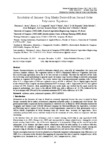Use este identificador para citar ou linkar para este item:
http://www.alice.cnptia.embrapa.br/alice/handle/doc/951407| Título: | Reliability of summer crop masks derived from second order polynomial equations. |
| Autoria: | ARRAES, C. L.  LAMPARELLI, R. A. C.   ROCHA, J. V.   ESQUERDO, J. C. D. M.   SALVADOR, P.   RODRÍGUES, J.   ROQUE, J.-L. C.   JUSTO, J. S.   BENATTI, B. G.   |
| Afiliação: | CHRISTIANO L. ARRAES, Unicamp; RUBENS A. C. LAMPARELLI, Unicamp; JANSLE V. ROCHA, Unicamp; JULIO CESAR DALLA MORA ESQUERDO, CNPTIA; PABLO SALVADOR, University of Valladolid; JAVIER RODRÍGUEZ, University of Valladolid; JOSÉ-LUIS CASANOVA ROQUE, University of Valladolid; JULIA SANZ JUSTO, University of Valladolid; BEATRIZ G. BENATTI, IMECC/Unicamp. |
| Ano de publicação: | 2013 |
| Referência: | Journal of Agricultural Science, Toronto, v. 5, n. 3, p. 63-75, 2013. |
| Conteúdo: | Remote Sensing techniques are useful to determine planted areas, especially of commodities like maize and soybeans (summer cultures). The vegetation indexes as NDVI (Normalized Difference Vegetation Index) has been used to map agricultural areas due to its low cost and accessibility. Therefore the objective of this study was to develop a new methodology to generate masks of summer crops based on fitting second order polynomial equations to temporal NDVI profiles. The results showed that selecting polynomial equations with r2 fitting above 0.75, a Kappa index of 0.86 and a global accuracy of 93% is obtained. This is slightly higher than the results obtained when using the maximum-minimum NDVI technique, with a Kappa index of 0.82 and a global accuracy of 91%. However, while quantifying the areas under study, one verified that the mask used by the proposed methodology, was closer to the official IBGE data, with a difference of -10.25%, followed by the vector technique with 23% and by the maximum-minimum NDVI, with a difference of 42.8%. |
| Thesagro: | Soja Milho Sensoriamento Remoto |
| NAL Thesaurus: | Soybeans Vegetation Remote sensing Corn |
| Palavras-chave: | Índice de vegetação |
| Tipo do material: | Artigo de periódico |
| Acesso: | openAccess |
| Aparece nas coleções: | Artigo em periódico indexado (CNPTIA)  |
Arquivos associados a este item:
| Arquivo | Descrição | Tamanho | Formato | |
|---|---|---|---|---|
| 22216821041PB.pdf | 1,99 MB | Adobe PDF |  Visualizar/Abrir |









